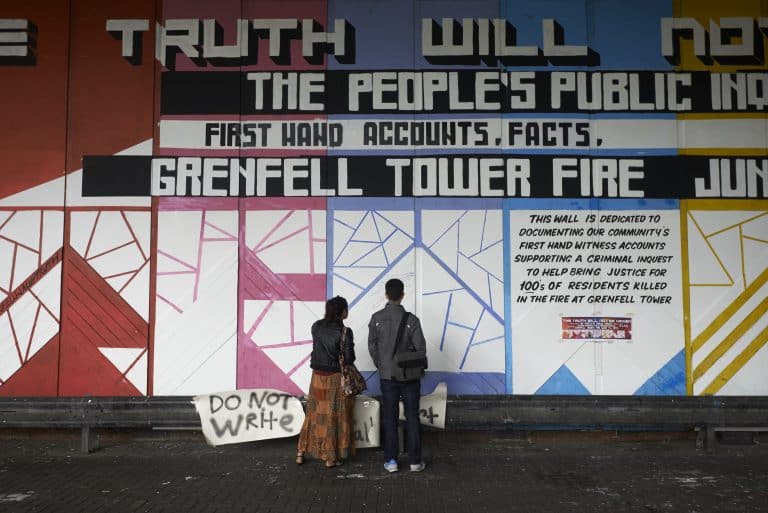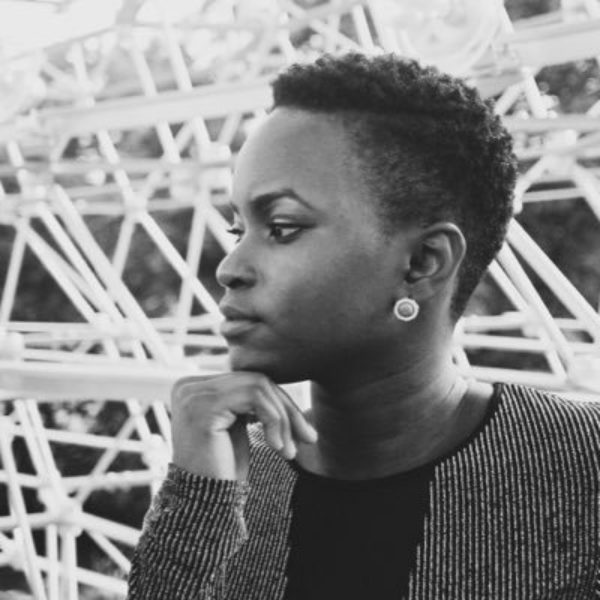
Image by Niklas Hall'en/Getty Images, © All Rights Reserved.
Bearing Witness: How To Help When Feeling Helpless After a Disaster
The Grenfell Tower fire found me on the morning of June 14, preoccupied with the inconsequential details of life: how to close my conversation with this barista with the same grace she has shown me; how to carry my bag, my coffee, and this lady’s pram with the grace that my dress can offer.
The fire waited for me to sit and then it hit me with all its horror. As I later watched the video of the firefighters arriving at the scene, one of them asking, “How is this even possible?” I thought of all the decisions and small compromises we make about the value of life, in public life.
Whitney Iles’ blog resonated with me when all the small blessings of community did not feel enough. Donations, acts of service, community organizing, being there, holding the despair of people still searching for their loved ones… these actions felt small. Hope felt really, really small. How do we help when one is feeling helpless? How do we hope when one is feeling hopeless?
The political philosopher Hannah Arendt once referred to totalitarianism as organized loneliness. In today’s public narratives, a terror is a public act of violence and it is remembered as an act against the state. It becomes a moment of unification where community and bureaucracy sit tidily next to each other. Grenfell Tower is a tragedy, a public act of violence, that has dismembered our social orders.
Community and bureaucracy no longer sit next to each other. The state finds itself simultaneously pacifying the anger against it, deflecting whatever traces of culpability remain, and performing the rites of mourning that are to be done. What do we make of hope when our grandest social experiments, community, and bureaucracy sit in tense opposition to each other? A tragedy like the Grenfell Tower fire is disorganized loneliness because it throws out in the open the messiness of social order — the contradictions in our public commitments of responsibility to each other and our private responses to one another.
Whitney Iles suggests one avenue to try:
“If you want to help create peace, we need to find balance between action and thinking. My belief is true action requires thinking through. Solutions require observation, analysis, and participation before strategies can be developed.
So today I say the same to you as I say each week to my students: If you want to help with long-term solutions, rather than reacting to crisis, learn to sit with your feelings.”
Learning to sit with your feelings of helplessness, that is, acknowledging the feeling of powerlessness, is the first step towards power. It reminds me of the first step of the Alcoholics Anonymous treatment program, where members admit their powerlessness over their addictions. It also reminds me of the practice of Dadirri by the Aboriginal people of Australia. Dadirri is the practice of “deep listening and still awareness” and it has been used as a communal ritual to heal trauma. Through Dadirri, a public space is created where people share their stories of trauma and are listened to with acceptance.
Sitting with your feelings, the First Step of the Alcoholic Anonymous program, the practice of Dadirri — these all require the power of witness for change to happen. To bear witness is to give meaning by acknowledging the legitimacy of the truth being proposed. In court, for example, a witness gives legitimacy to the facts and logic (truth) being offered.
In reading Whitney’s words and reflecting on these communal forms of healing, I realize our power as citizens is to bear witness to the communities affected by the fire — and not to the fire itself. In addition to learning to sit with our feelings, we bear witness by learning to sit with the injustice and learning to sit with the process.
If donating and acts of service feel small, it isn’t that these actions are insignificant, but that they are not enough to deal with what has happened. Grenfell Tower is not an accidental event; it’s a system of power with intentional choices taken by people, legitimized by people, and executed by people. Learning to sit with injustice is to ask tough questions beyond who is to blame. Kate Schick refers to this as “working through,” a “politics of mourning that refuses to gloss over past and present pain, but that sits with suffering and allows it to challenge our deeply held assumptions about social and political arrangements.”
The answers to these tough questions won’t be about cladding. They will be about inequality, political accountability, the politics of austerity, our disregard for working class people. They will necessarily yield these answers if we want to move from powerlessness to power and they will require us to locate ourselves within the systems of injustice.
Activism is to remain firmly angry about an injustice and to use that anger to focus on the possibility of change, not on the probabilities of the past. To be a witness to the communities affected by the Grenfell Tower fire is to acknowledge the trauma with anger but to move forward with it in hope because the communities affected are moving on. And, if you want to be a witness to them, you move with them too.
This means questioning the regenerative nature of your actions. Donating may not feel like enough because it moves with the victims up to a certain point. How can you use this anger to constantly bear witness? What actions will you take in six months, one year, or even five years’ time at the General Election, to make sure change is happening that is meaningful to the affected communities? Injustice is a process which means social change must also be a process.

